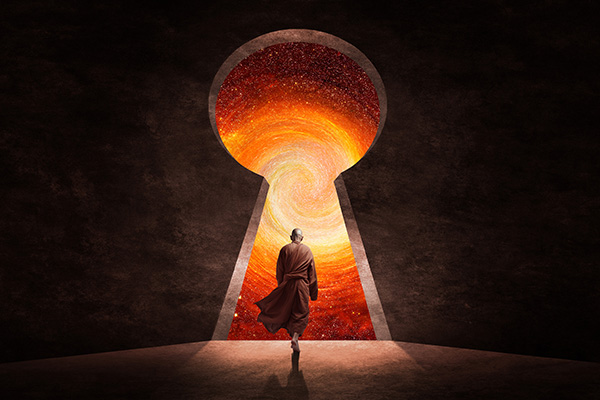spiritual principles
When Walking Away Is A Sacred Act of Love
 One of the most life-changing truths we come to face on the spiritual path is this: not everyone is meant to walk with us all the way.
One of the most life-changing truths we come to face on the spiritual path is this: not everyone is meant to walk with us all the way.
As we awaken and align more closely with our authentic self, some relationships begin to fall away. While it’s natural to resist this because endings hurt and change can feel like loss, there is a quiet, sacred truth beneath it all: Letting go is often an act of love.
As your soul expands, you begin to see your relationships differently. They are no longer just emotional bonds or physical connections; they reveal themselves as soul contracts—agreements made on a spiritual level before you ever met people in the physical realm.
Some people come into your life to uplift you, to love you, and to walk beside you for the long haul. Others arrive to teach you about boundaries, self-worth, and discernment. Once their role is complete, the relationship may start to feel heavy, strained, or even harmful. This isn’t failure; it’s a sign that the contract has been fulfilled.
Yet, this part of the journey is rarely discussed. In spiritual circles, we often hear messages about unconditional love, compassion, forgiveness, and acceptance. These are indeed sacred spiritual principles. But we rarely hear the equally sacred teaching that sometimes the most loving thing you can do is walk away!
Letting go of a toxic or misaligned relationship is not abandonment or selfishness. It’s not also not a sign of weakness, cowardice, or a lack of spiritual depth. In fact, it often requires more courage and clarity than staying.
What It Really Means To Live A Spiritually Aware Life
 It doesn’t matter who you are or what you do for a living. It doesn’t matter how much money you make, how popular you are, where you live, or how attractive others find you. None of these things define your true worth, and none of them guarantee the fulfillment of your life purpose and soul plan.
It doesn’t matter who you are or what you do for a living. It doesn’t matter how much money you make, how popular you are, where you live, or how attractive others find you. None of these things define your true worth, and none of them guarantee the fulfillment of your life purpose and soul plan.
In the end, your spiritual wealth transcends any bank balance. The only bling that really matters is how much your soul shines from within!
Many of the most beautiful, caring, thoughtful, compassionate, and charitable souls walk quietly among us — unrecognized by the world’s superficial standards of success. They may not be rich. They may not be famous. They may not wear designer clothes or have thousands of social media followers. And yet, they truly shine!
What really matters is how you treat others, how you live your life, and how you embody your higher self and the light of of your soul in everyday moments. That is what counts in the eyes of God, Source, Spirit, the Divine. The essence of your spirit, not your resume or your reflection in a mirror, is what will leave your legacy in this lifetime.
The essence of this truth echoes throughout the world’s spiritual traditions, reminding us that attachment to wealth, superficial pleasures and material status can become hindrances to our spiritual journey and soul growth.
In Hinduism, for example, the Bhagavad Gita teaches that only those who see the divine in all beings and remain unattached to sense pleasures will find lasting peace. Similarly, in Buddhism, the Dhammapada warns that wealth can ruin the foolish, and the desire for wealth becomes an obstacle to enlightenment. The Buddha taught that spiritual liberation requires renunciation of attachment and the cultivation of inner clarity.
The Divine Path Back To Unconditional Love
 Recently, I was meditating on a deeply personal situation — one that stirred up waves of anger and resentment, even bordering on hatred and bitterness. Then I received an insight from spirit that stopped me in my tracks. It was one of those profound moments when time stands still and sacred truth illuminates your heart.
Recently, I was meditating on a deeply personal situation — one that stirred up waves of anger and resentment, even bordering on hatred and bitterness. Then I received an insight from spirit that stopped me in my tracks. It was one of those profound moments when time stands still and sacred truth illuminates your heart.
“Never forget the Golden Rule,” spirit said. “Do unto others as you would have them do unto you. Do not do to others what you do not want done to you. Do unto others as you would have them do unto you.”
Suddenly I realized that the deeper truth of holding unconditional love in your heart. It’s a universal spiritual principle because it works both ways! You would never, ever want the same hatred or anger that you direct at others, to be directed at you.
Now let me be honest. My anger this time wasn’t just outward to others. It also turned inward. It was a growing dark, toxic presence in my heart and mind.
Life has been hard lately. Too many people I know have died far too young. Watching my beloved partner in a so-called “medical facility” that should not be allowed to take care of anyone, especially our elders. Almost losing him. Being emotionally and financially drained by someone I trusted. The exhausting noise of political chaos.
It has been one thing after another, piling up until I reached a boiling point. I began to ask the big, painful question: Why? Why all this suffering? Why now? Why me? And I wasn’t just angry at the world — I was angry at myself. Angry at Source, Spirit, God. Angry at the seeming cruelty of it all.
Reincarnation And The Karmic Journey Of The Soul
 Reincarnation — the belief that the soul experiences multiple lifetimes through a continuous cycle of birth, death, and rebirth — is embraced by many spiritual and religious traditions worldwide. Wisdom traditions such as Hinduism, Buddhism, Jainism, and various indigenous belief systems integrate reincarnation deeply into their teachings.
Reincarnation — the belief that the soul experiences multiple lifetimes through a continuous cycle of birth, death, and rebirth — is embraced by many spiritual and religious traditions worldwide. Wisdom traditions such as Hinduism, Buddhism, Jainism, and various indigenous belief systems integrate reincarnation deeply into their teachings.
For those who embrace the concept, reincarnation offers a transformative perspective on life and mortality. When we believe that our soul consciousness continues beyond this life, death is no longer something to be feared. Instead, it becomes a transition — a doorway to new opportunities for growth and evolution. Reincarnation provides a rich and expansive framework for understanding the soul’s journey.
Whether you fully embrace the concept or explore it with curiosity, reflecting on the interplay of karma and rebirth can inspire greater mindfulness, compassion, and purpose. In this view, death is not an end, but a passage — a gateway to continued exploration and spiritual progress.
Belief in some form of continued existence beyond this life is widespread. A 2011 Ipsos Global Advisor survey of more than 18,000 people in 23 countries found that 51% of respondents believe in an afterlife that includes beliefs in heaven, hell, and reincarnation. Specifically, 7% of respondents said they believed in reincarnation.
In the United States, a 2021 Pew Research Center survey found that approximately 33% of adults believe in reincarnation. This belief is more prevalent among younger adults under 50 (38%) compared to those aged 50 and older (27%).
Did Your Soul Choose Your Life Challenges?
 “Oh, why do I have such terrible karma?” or “Why does the universe keep throwing me curveballs?” or “Is God punishing me?” These are questions that clients often ask me when they face struggles in life.
“Oh, why do I have such terrible karma?” or “Why does the universe keep throwing me curveballs?” or “Is God punishing me?” These are questions that clients often ask me when they face struggles in life.
Spirit has repeatedly shown me in many readings over the years that we all have a kind of “architect’s plan” that we design before we incarnate into this life. This soul plan for our life journey lays out the lessons we’re going to learn and the experiences we’re going to have.
This spiritual principle is known by various names (depending on the context or belief system), including our spiritual blueprint, life design, divine plan, life script, soul contract, predestined path, and so on.
I prefer “architect’s plan” because it reminds me of the careful, meticulous planning an architect does when designing a new structure, long before the practical, hands-on construction takes place on site.
Like architects, we calmly and clearly create a plan for our life journey before we incarnate. It is only when we are here in the physical world to embody our plan that we fully experience the intensity and the many dangers and pitfalls that are part of our chosen journey, including all the fear, love, pain, hardship, joy, suffering, and everything in between.
Yes, it is hard to believe that we actually choose to face challenges and difficulties in our lives. But various spiritual traditions and esoteric philosophies tell us that our soul’s path is predestined or planned before we’re born, or at least that we have certain free will choices and options along the way.
Letting Go Of What No Longer Serves You
 Letting go is never simple or easy, but it’s often necessary for our health, happiness, and spiritual growth. It’s a powerful act that frees our soul and honors our true essence.
Letting go is never simple or easy, but it’s often necessary for our health, happiness, and spiritual growth. It’s a powerful act that frees our soul and honors our true essence.
Letting go is about releasing what no longer serves us to create space for more joy, peace, abundance, and meaningful experiences to flow our way. It’s not about loss or sacrifice – it’s about making room for something better.
By letting go, we deepen our connection to our Higher Self, Spirit, and the Divine. We release the burdens that limit us, allowing us to step into our best life.
It’s a conscious choice to stay stuck or move forward. This means choosing to let go of negative thoughts, emotions, desires, habits, beliefs, or material things that hold us back. When we release these attachments, we open the door to new blessings, miracles, and personal growth.
Choosing to let go and taking the first steps can sometimes feel daunting. It’s normal to feel overwhelmed, but trust that each step you take to release the old and welcome the new brings you closer to peace, joy and lasting fulfillment.
As we release old patterns, we often feel lighter, more energized, and at peace. This newfound freedom allows us to explore new possibilities, pursue our passions, and live authentically. It’s not about forgetting – it’s about freeing ourselves from what holds us back and stepping into the full light of our true potential.
The Miracle Power Of Divine Timing
 Patience is considered a virtue, something that makes us better people. But it’s so much more than that — it’s a spiritual principle that can truly transform your life for the better.
Patience is considered a virtue, something that makes us better people. But it’s so much more than that — it’s a spiritual principle that can truly transform your life for the better.
In today’s fast-paced, click-now world, where everything is at our fingertips, it can seem a real struggle to practice patience. But being patient isn’t just about waiting. It’s about how you wait.
It’s about slowing down, taking a deep breath, and letting go of the need to control everything. Patience is not about being passive or giving up; it’s about trusting the timing of the universe and going with the flow.
Everything in life happens exactly when it’s supposed to, even if it doesn’t feel that way in the moment. There’s always a bigger plan at play — one that we co-create with the universe through our thoughts, intentions and actions. When you trust this process,you soon discover that even setbacks and obstacles are actually stepping stones.
When things don’t go as planned, it’s easy to get frustrated and think that nothing is working out. But often what feels like a “no” or a delay is actually the universe saying, “Hang in there, I’ve got something better for you. Patience is about believing that everything will eventually make sense, even if you can’t see it now.
The problem with impatience is that it upsets everything. It’s like trying to push a door that’s supposed to pull — it just creates resistance. When we’re impatient, relationships can crack under pressure. Work can feel unstable or hard to pin down. Money problems seem bigger and harder to solve. Impatience feeds frustration, and frustration can create an energy block that pushes the good stuff away.